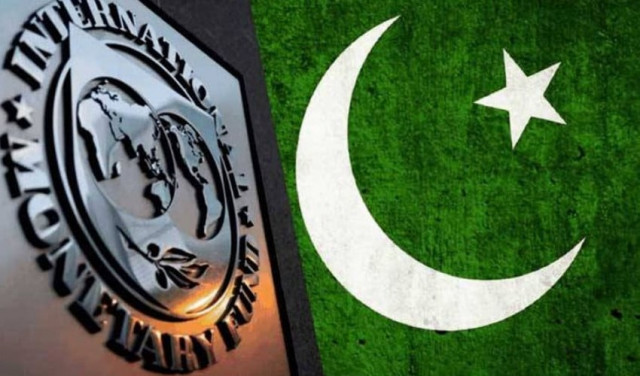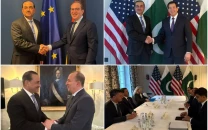IMF says talks on budget to continue
The sources said that the IMF asked Pakistan to propose alternate measures to provide relief to the salaried class.

The International Monetary Fund (IMF) on Saturday returned to Washington without formally concluding discussions, saying that the talks would continue in coming days with a view to "agreeing on the budget", in a statement that shows gaps between the two sides.
"We will continue discussions towards agreeing over the authorities' fiscal year 2026 budget over the coming days," stated Nathan Porter, the outgoing Mission Chief to Pakistan, in a statement issued after the end of 10-day talks held on the contours of the new budget.
Porter said that the discussions focused on actions to enhance revenueincluding by bolstering compliance and expanding the tax baseand prioritise expenditure".
The IMF mission was scheduled to arrive in Pakistan on May 13 till May 23 but due to India-Pakistan tensions, it held the first round of talks from Turkyia. The face-to-face discussions began on May 19 from Islamabad but did not conclude within the pre-agreed timeframe.
The IMF said that its staff visit was focused on recent economic developments, programme implementation, and the budget strategy for fiscal year 2026.
The government sources said that there was broader understanding on the next fiscal year's overarching goal of primary budget surplus; however, there were gaps in the understanding of both sides, particularly over the modus operandi to reach the goal.
Porter said that the authorities concerned reaffirmed their commitment to fiscal consolidation while safeguarding social and priority expenditures, aiming for a primary surplus of 1.6% of GDP in FY2026.
At the next fiscal year's projected size of the economy, the surplus will be equal to nearly Rs2.1 trillion, which is slightly lower than what the Ministry of Finance stated last week.
Interestingly, the IMF said that based on the preliminary findings of this mission, the IMF staff will prepare a report that, subject to management approval, will be presented to the IMF's Executive Board for discussion and decision.
The government sources said still no consensus had been reached over the next fiscal year's tax target, some revenue measures and relief to certain sectors. They said that the target would depend on the spending outlays for the three major heads of the budget.
There were also gaps on the points of giving relief to the salaried class, the real estate sector and taxing of pensions, said the sources.
Last week, Prime Minister Shehbaz Sharif termed the proposed relief for the salaried class by the FBR as insufficient and instead asked the tax machinery to secure more relief. The senior FBR and the finance ministry negotiators said that the quantum of the salaried class relief was not yet decided.
The sources said that the IMF asked Pakistan to propose alternate measures to provide relief to the salaried class. The Fund suggested imposing taxes on high-end pensioners and using the money for providing relief to the salaried class.
However, the IMF's condition to link relief for the salaried class with other measures which, in fact, is a reversal of injustice done to it in the last budget, was not justified.
The salaried class has already paid Rs437 billion in income tax compared to less than Rs4 million by the traders.
The IMF's statement on broadening the tax base seems cosmetic, as it did not do anything against the government's failure to collect due taxes from retailers.
The sources said that the government's view about taxing the pensioners was that it would be a politically difficult decision to tax the high-end pensioners.
The government is again inclined to provide relief to the realty sector, particularly reducing the transaction taxes, which is not in line with the IMF policy for the sector. The IMF had already agreed to abolish the federal excise duty, FBR Chairman Rashid Langrial said last month.
Nathan said that the IMF "held constructive discussions with the authorities on their fiscal year 2026 budget proposals and broader economic policy, and reform agenda supported by the 2024 Extended Fund Facility (EFF) and the 2025 Resilience and Sustainability Facility (RSF)".
Porter said that discussions also covered ongoing energy sector reforms aimed at improving financial viability and reducing the high-cost structure of Pakistan's power sector as well as other structural reforms which will help foster sustainable growth and promote a more level playing field for business and investment.
The sources said that the IMF did not agree to the Power Division to allocate nearly 1% of the GDP power subsidies and consented to give Rs1.04 trillion.
The government has already delayed the budget by over one week to June 10th after it could not timely sort out all the issues before approving the summary to announce the budget on June 2.
Porter said that Pakistan also emphasized their commitment to ensuring sound macroeconomic policy making and building buffers. "In this context, maintaining an appropriately tight and data-dependent monetary policy remains a priority to ensure inflation is anchored within the central bank's medium-term target range of 5-7%" said Porter.
Porter reiterated his earlier statement and emphasized that "rebuilding foreign exchange reserve buffers, preserving a fully functioning FX market, and allowing for greater exchange rate flexibility are critical to strengthening resilience to external shocks".
Despite the IMF programme, Pakistan this time is not able to fetch in major foreign loans due to a poor credit rating.
Porter said that the IMF team will remain engaged and continue its close dialogue with the authorities and the next mission associated with the next EFF and RSF reviews is expected in the second half of 2025.






















COMMENTS
Comments are moderated and generally will be posted if they are on-topic and not abusive.
For more information, please see our Comments FAQ